I Was Born to Be Your Mother
Black in Business
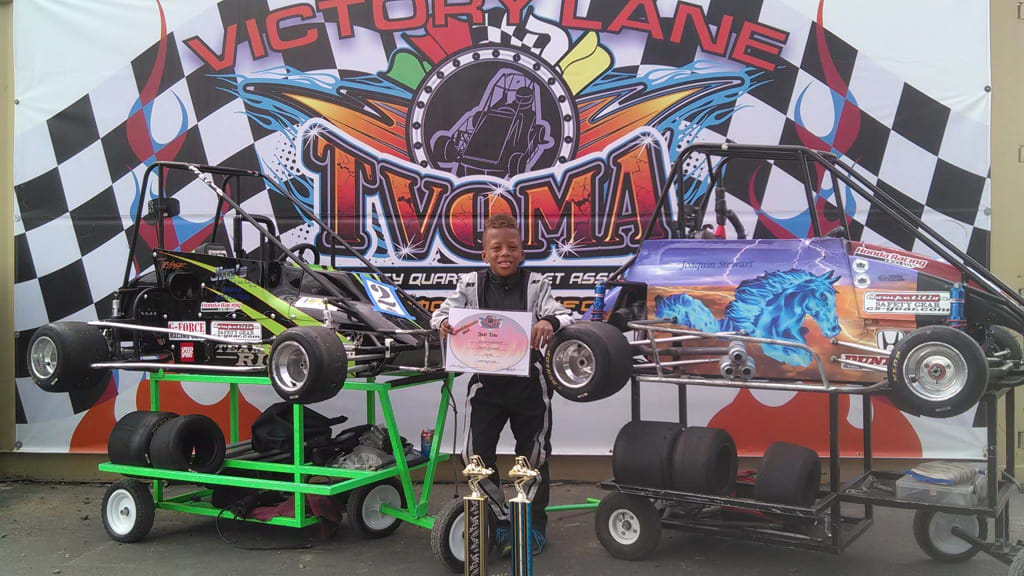
“You’re a great mom. You’re a great mom,” is what I hear a lot of people telling me now. But what makes it so? What’s the measure of success? And who set it? I’ve always believed that we really know who we are and what we’re meant to do from an early age. But for most of us, our true paths get blocked and clouded by the judgements of those closest to us. They say, “You’ll never be able to do that. There’s no money in that. Do you know how hard it is to get into that? Just get a job so you can pay your bills. Stop dreaming.”
Stop dreaming. But within the dream lies the answer. If a thought continues to push its way to the forefront of your consciousness its for a reason. It’s what you’re meant to be doing. It’s who you really are. It may make you rich and successful by society’s standards or it may not. It may make you liked or loved by others or it may not. It may get your name placed into the history books or it may not. What it has done for me is help me find my happiness.
The date of my birth 4/11 is significant to me. I often hear myself telling people, “I am 411, because of my birthdate, I am information.” Of course, I don’t know it all like information or Siri, google and the internet help me fill in the blanks at times, but growing up I spent a lot of time trying to gain knowledge and seek the truth. Knowing what is true is what keeps me balanced on this journey because I’ve had a few experiences in my life that should have pushed me over the edge.
I’m thankful for the many people throughout my life who have motivated and inspired me to become the black entrepreneur I am today. The first of whom was Dr. Martin Luther King, Jr. I was born one week after he was assassinated. Seven days after one great leader was taken from this earth another great leader was given to it.
Although I love politics and think there’s politics in every aspect of life, I’m not a world leader to the level of Dr. King, yet. In 2012 I ran for my first political office, US Senator of California, against Dianne Feinstein placing 10th out of 24 opponents in the primary.
With no budget to spend on campaign marketing and ads, no endorsements, and no prior political experience I received 80,000 votes and had the second highest placement among the five Democratic candidates.
People have asked me how I was able to do that. It has to do with my name. My name is Diane Stewart. It’s generic enough and easy to pronounce so you know I’m American, but it doesn’t uncover my ethnicity right away.
The second political office I ran for was School Board Member of Byron Union School District in 2014. Again, I didn’t spend any money to campaign. I didn’t put out any lawn signs. I received a free write up in the local newspaper and attended the only meet the candidate’s session that we had. My placement on the ballot was horrible, you had to turn it over and search on the back to cast your vote for me, but still I won one of the three seats available against five opponents.
Winning that seat was a joy. During my four years on the board, I was able to be very involved in my community and hopefully encouraged a lot of people to step up and be heard. There were a lot of children in the district, mostly blacks and Hispanics, who were made to feel less than by their educators and demotivated from becoming high achieving students. I understood how they felt, and it brought up my own memories of having been educated in that same type of system.
In 1976 I was in the third grade and learned how to play a musical instrument. My first choice was to learn the trumpet, but my teacher told me my lips were too big for the mouthpiece and she had me learn the baritone horn instead. I didn’t understand why she would make that comment and I believed she just wanted more people to learn bass clef instruments, but it was a subtle introduction into the racism I was going to face for years to come. That’s how they do it in California. The racism is there, it’s just subtle.
In time I loved playing the baritone horn and its melodic tone. It allowed me to hear a piece of music in its entirety when other instruments were overpowering the melody. But imagine little 4’2” Diane struggling to carry this humongous instrument several blocks back and forth to school.
Lifting and walking block after block the arduous dance of tiny feet waltzing with a hippopotamus was exhausting. So being the innovative thinker that I was I decided to strap the instrument around my skateboard and ride it whooshing effortlessly down the streets to school.
When I was in middle school, I told my seventh-grade music teacher that I wanted to learn how to play every instrument ever created. He told me that I already knew every instrument because I could play the piano. That wasn’t sufficient enough for me and I went on to learn how to play the flute, French horn and trumpet.
Today, I’m not an affluent musician. The farthest I took my music career was playing for the Solid Gold Sound of the UCLA Bruins Marching Band throughout my college years which brings me to another person who inspired me in my life, my brother Bryan.
Only 364 days older than myself, my brother and I grew up in the middle-class suburban streets of South San Jose, CA. Our four-bedroom home was on the corner of the cleanest street in the neighborhood. And we were one of three or four black families in the predominantly white community, but neighbors looked out for neighbors.
Not allowed to have kids over to our house while our parents were at work, the mischievous nature of minions took over the minds of our friends who begged us to let them inside our shrine. But the repercussions of doing so was not worth the trouble because my brother or I would have to bear the consequences of their dumb ass antics such as throwing cookies over the fence to our neighbor’s dog. Luckily, we were so involved with playing music and sports that it was more than enough socialization for us to interact with other kids solely at recess and lunch at school.
Being Irish twins raised in the same household by the same parents, I thought my brother and I were alike. He was the reason I strove to do well in school. If Bryan was going to graduate high school with Calculus than I was going to graduate high school with Calculus. He went on to get a BS in Computer Science from Stanford and a master’s degree from the Naval Academy in Monterey. I went on to get a BA in Political Science from UCLA.
After college, my brother went to work as a graphic artist for a company that was developing virtual reality software for the military. This technology eventually grew into products such as the Oculus goggles. Other than his lead to follow, much of my internal motivation to be somebody developed due to what I perceived as others not believing in me starting with hearing from my parents that I couldn’t do this or that because I was a girl.
So, I asked them to sign me up for baseball instead of softball. My dad coached my brother and I when we played on the same team one season. Truth be told my dad picked me to be on the team because he thought the other coaches wouldn’t choose me. As motivation, he offered to pay us $50 if we hit a home run during the season. My brother hit an in-field home run and my father paid us both the $50.
A few games later, I hit an over the fence real home run and I was expecting to receive another $50 but my dad didn’t pay me saying that he had paid me with my brother’s achievement. That did not sit well with me. I didn’t need him to pay me when my brother hit the home run because he didn’t think I could hit a home run. I needed him to honor the deal once I achieved it on my own. Eventually I made it on to an All-Star team on my own merit. When my brother made it on to an All-Star team, he was placed as an alternate.
I also chose to play boys soccer instead of girls soccer. Originally, my parents signed me up for girls soccer but during a game one of the girls got hit with the ball and started crying which I thought was week. The next season I asked my parents to sign me up for boys soccer and they told me I wasn’t going to receive special treatment because I was a girl. I would have to do everything the boys were asked to do. I agreed.
During one game, the opposing coach could be heard saying, “Go down the girl’s side.” I played full back and the little boy brought the ball down my side of the field thinking it would be easier to score getting past me. As he approached, I wrangled the ball away from him and kicked it so far back down the field that I almost scored a goal in the other team’s net. The ball bounced off the goal post instead. When they got the ball back, the opposing coach said again, “Go down the girl’s side.” This time the little boy responded, “No! She’s mean!”
While that was a fun opportunity and makes for an entertaining story, other stories growing up were the ones that hardened me and taught me how to fight. Such as the night before my first day of high school when my father sat my brother and I down to tell us he was leaving our family.
Then a few months later he called us to say, “I’m only going to ask you this question once and I want a yes or no answer. Do you still want me to be your father?”
Twenty years would go by before I would have what he termed a father again.
For the most part I think I had good teachers who encouraged me to pursue higher education. Then there were those people in the education field who discouraged me from reaching my highest potential.
Such as, the black female high school counselor who suggested I enroll in Math 2 my freshman year instead of going into Geometry. I was doing well in Algebra 1 in eighth grade, but I took the Math 2 class she enrolled me in for ninth grade. The next summer I took Geometry so I could enroll in Algebra 2 my sophomore year and get back on course to graduate with Calculus.
I recall asking my Caucasian freshman English teacher after class one day, “What can I do to get into a good college?”
“You’re already doing it,” she replied. “You’re black and you’re a woman.”
That was it. No explanation. What type of advice is that to give any student? Was she suggesting I shouldn’t work hard to get into college? Or was she directing me towards sluffing off thus reducing my chances of getting into any university at all?
You can’t just coast into the college of your choice. You have to take precise classes and achieve the best grades if you want to control your destiny instead of only receiving what they think the system wants you to have.
Most of my worst days in high school occurred during my junior year. It wasn’t because I wasn’t achieving things. I had received my letterman’s jacket as a freshman playing varsity softball. I was freshman and sophomore athlete of the year. I was a cheerleader and drum major for the marching band. And I was doing well in my academics. But that was the year adults were really trying to tear me down psychologically.
This one particular day as I sat at my desk in honors English class listening to the teacher, he began to describe a conversation he had with a student from his other honors English class in which she said she was going to write her paper on, “The Advantageous Benefit of Bringing Back Slavery.”
The words burned through my ears as anger riveted inside me. I clenched the sides of my desk to hold me back from unleashing my rage. “HOW DARE YOU!” I thought as laughter from the other students rippled through the darkness my teacher had just banished me to.
Why would you say that to the only black student in either of your honors classes? Why would you say it at all? Why would you want another race to suffer as your people suffered? I wish we would have sued that teacher and the district back then.
Then there’s the lady in the career center who questioned me over and over again when I asked her to give me the paperwork for a Portuguese scholarship.
“You have to be of Portuguese decent,” she said.
“Can you please give me the paperwork?” I replied.
“But you have to be able to prove that you’re Portuguese,” she stated.
“Can I please have the paperwork?” I responded again.
She handed me the paperwork, but I was so insulted and upset by her accusations that I didn’t apply for the scholarship.
Who was she to think she knew me or who I was based on the color of my skin? Black people are from every part of this globe not just Africa. I didn’t need to explain to her that my grandmother was full blooded Portuguese.
I just needed her to do her job and hand me the scholarship paperwork. It was the first time I let someone outside of my family prevent me from achieving something I wanted to do, and it would be the last.
Attending UCLA was one of the best times in my life. My original desire was to go to Law School. But one day as I was standing outside my dorm building, Dykstra Hall, looking down Bruin walk and across campus, something told me that even if I obtained a Law degree, I wouldn’t practice law. It told me I wanted to be an entrepreneur and own my own businesses.
UCLA didn’t have an undergraduate business degree, but their accounting certificate program allowed me to take accounting classes so I would know what my accountant was doing. Knowing accounting led me to my first jobs following school. And a bookkeeping and accounting company was the first business I started on my road to being an entrepreneur.
For the most part I didn’t experience any forms of racism at UCLA. There was only one class that I had to defend myself against Affirmative Action where the white students felt black students only got into the University because of their skin color and not their brains.
It was the only time I saw all ten black students out of 300 students in the class sit near each other in the auditorium. But I made my argument that I had the high GPA and SAT scores to deserve to be at the University.
And if Affirmative Action is the reason the admissions board accepted me, Affirmative Action wasn’t the reason I was able to remain at the University. I needed to have the grades and pass the classes just the same as they did. If people could just be fair and impartial, there wouldn’t have been a need for Affirmative Action in the first place.
It was while I was attending UCLA that a childhood acquaintance of mine made a monumental accomplishment at the 1988 Olympics. Debi Thomas, who came to my fifth birthday party and went to Stanford with my brother, won the Bronze Medal in Figure Skating.
I had wanted to learn how to figure skate when I was a child but felt my parents wouldn’t support my goal. You have early morning practices. It costs a lot for coaches and costumes and travel. My parents weren’t going to do that for me.
It’s not that we didn’t have the financial resources. My mom worked for PG&E and my dad was a manager at IBM. In fact, he himself is a great black creator. Back in the 1970s IBM had a typewriter that would type the letters onto the paper with a rotating metal ball. My dad was on the project team that created a typewriter that produced the letters on a screen as you typed. Without this ability to get letters to appear on a screen we wouldn’t have texting or computer screens today.
Although I didn’t learn to ice skate as a child, I took up the sport and learned at the age of 27. Luckily for me the United States Figure Skating Association had an adult league where I could compete. Each year around my birthday I would travel to different parts of the United States to compete in Adult Nationals. One of my best performances was a medley of Diana Ross songs.
Then in 1999 we had our first Adult International competition in Villard-de-Lans, France. I proudly took a photo in front of the sculpture depicting the place where they had held the 1968 Olympic Hockey competition because 1968 was the year I was born.
Next the International Skating Union, the organization that runs the Olympics, opened up an adult skating competition in Oberstdorf, Germany. I felt like this was our Worlds competition.
For ten consecutive years my mother and I traveled to these competitions and each year we would spend three weeks abroad. After the competitions we would travel to other places I wanted to see.
We’ve been to cities in England, France, Germany, Switzerland, Austria, Spain, Portugal, Italy, Greece, Egypt, Rhodes and Turkey. We’ve seen the Pyramids at Giza, the canals in Venice, the Eiffel Tower, Ludwigsburg Palace and Nuremberg Castle in Germany, Hofburg Palace in Vienna and the Palace of Versailles to name a few.
It was great being able to attend these events and make friends all over the world. One of my friends, Gulia, started a competition in Russia. I’d always want to visit Russia and now I was going because of ice skating and not as a tourist.
Russia was everything I’d imagined it would be. The competition was in February, so the temperature was negative ten degrees. There was ice and snow on the ground and the sky was grey. The women walked around in stiletto heels like Natasha from the “Rocky and Bullwinkle” show. And the architecture was phenomenal.
My friends worried I would fall walking outside with only tennis shoes, so they bought me a set of beautifully hand stitched galoshes. And another friend bought me a Matryoshka nesting doll.
We went on a tour of three cities along the Golden Ring: Vladimir, Suzdal and Kiev. Visiting Kiev was significant to me because my junior high band teacher introduced us to a piece of music called “Great Gate of Kiev” and now here I was walking through the actual great gate of Kiev.
During this trip I was going to have to process payroll for one of my bookkeeping clients. Because of the eleven-hour time difference, I informed them that they would need to get me the information by a certain time since the only place I could get internet closed at six. They sent it in late, of course.
Unable to receive internet in my hotel room, I went down to the sports café, at 2:00am, where internet worked on my computer to try and get their payroll generated on time. Sitting outside, it was so cold that even my computer didn’t want to boot up.
As I’m sitting there with my computer looking like ET phone home, a military jeep with two Russian guards approached me. Following a brief discussion, they told me I couldn’t stay out there and made me return to my hotel room.
These adventures for me were fantastic including three trips to the country where my great grandparents came from, Cape Verde. However, they also showed me how much black people are disliked around the world.
It’s not that I was necessarily discriminated against. It was a look I would get from some people or things they would say that made me feel as if I didn’t belong there.
The best part of all that travel was it was all paid for in cash. None of it was paid for using credit. I was able to do this because of a budget spreadsheet I had created.
The spreadsheet allowed me to manage my finances and live a lifestyle of my choosing. So I began teaching others how to create their personal budgets and manage their finances. After several years of assisting others with making their financial dreams a reality, life took another turn. At the age of 40, I had my son.
My family treated me as if I were 16 and pregnant. They assumed I wouldn’t know how to raise a child. I said it would be as easy as taking care of my cat.
My father gave me the story of how it took him 60 years to finally get the car of his dream. I pointed out that the car of my dream was sitting in my garage. All the travelling I was doing and being single was getting boring. I hadn’t found my husband to settle down with and raise five children. This was my opportunity to be a mom.
Since the day he was born, my life has had new purpose. I wanted to raise him in a house like I was raised, not an apartment, so I moved to what I thought was the perfect place for us. Things were going very well. Then at the age of two I bought my son the Disney “Cars” movie and he said to me, “I want to be a race car driver.”
I said to him, “Ok. You’re two years old. You know the cars crash, catch on fire and people die?”
He shook his head yes.
“Well, I guess you can be a race car driver.” I replied. I could see it was his passion. He ate, drank and slept racing day after day after day everything was racing. I had no idea how to get him into the sport but I thought I would have at least until he was 16 and got a drivers license. I was wrong.
A week later we went to a festival in town and there was a kid with a go-kart at a booth passing out fliers to a track 30 minutes from our house. The flier was inviting us to a promo day where kids aged four and a half to 16 could go and try out racing. They would provide the equipment, the car, some training and for $10 you would do ten laps around the track all powered by the child.
They were gas powered cars with an accelerator and a brake. Of course, the throttle was slowed down for these beginners, but since my son was only two, I had a couple of years before he could try this out.
I made sure we didn’t lose that flier. Two and a half years later we went to the track in Livermore and took the first steps on the path to his dream of becoming a race car driver.
On that first day, he was ready to embrace the racing lifestyle. He pumped his chest out proud and stood up as tall as his little body could reach. They suited him up, put the helmet on him and strapped him into the car.
As he was waiting his turn and receiving instructions, fear came over him. The instructor called me over to see if I could calm him down, but I knew what it was like to get a panic attack when you’re in an uncomfortable situation.
“Can I do it without the helmet?” asked my son.
“No, we can’t let you do that” replied the man.
“Go ahead and take him out of the car,” I said. “Maybe he’s too young. We’ll try again next year.”
The man didn’t want to give up that easily. They decided to jog him around the track as he rode in the car. Halfway around the track my son decided he would be able to do it. They put him into another car, placed the helmet back on him, pushed him to start the engine and he was off. A race car driver was in the making.
This was it. This was my chance to be his strong parental support. The type of support I desired as a child but didn’t receive. I thought I had moved out to Discovery Bay because it was a beautiful and calming area and a great place to raise my child.
Turns out, I didn’t get to move out there because I liked the place. I got to move out there because my son needed to be a race car driver. Racing was going to be a big commitment of time and money. But what better investment could there be than to invest in your child?
My stepmom helped me buy his first Quarter Midget car, but I didn’t have a vehicle that could tow it. I would rent Uhaul trucks to get us to his races and his practice time came on race day because even though the track was open to members 24/7, I wasn’t able to get him out to the track to practice.
But that didn’t stop us. He would practice at home with is miniature NASCARs creating races and working on his skills. I worked on his car and became his pit crew mommy. I bought him a second car which didn’t make us popular with some club members and then he began to show his talent.
When he was a Novice driver, every kid would receive a trophy no matter where they placed in the race. But after his first race as a Junior Honda driver, he didn’t get a trophy and he asked why. I explained to him that you have to place 1st, 2nd or 3rd in order to receive a trophy.
From that day until the end of the season he would place 2nd and 3rd collecting trophies and building up points towards the championship. The next racing season his accumulation of points placed him in contention to be the Junior Honda Champion. But the club President and other members wanted another kid to win it.
“We’re making the last race his zero point throw out race,” said the club President.
“Your driver turns nine before the last race which according to the rule book makes him a senior driver and ineligible to enter the junior race,” I countered. “He can’t earn zero points or 47 points if he can’t enter the race. And of the seven races that he did compete in you have to throw out his points from one of those races.”
Having right on my side didn’t sit well with them. The day of the last race was upon us. My son drove his little heart out and finally won his first 1st place trophy in Junior Honda. And then they took it away from him.
They had planted an illegal valve spring into my engine disqualifying my son from the win. He was devastated and didn’t understand why he wasn’t the winner.
“You stand here and cry in front of these men and show them what they did to you,” I told him. “It'll be taken care of and corrected when you least expect it.”
The next season my son won the Junior Animal Championship.
“Look around,” I told him.
He turned to see all the kids of the parents who I felt were in the conspiracy that took away his first 1st place trophy in tears.
“It's been taken care of and your wrong has been corrected,” I said. “If your destiny is to be a race car driver, there’s nothing anyone else can do to stop it.”
Throughout my life, I received more support and encouragement from strangers than from key members in my family. But that need to prove those family members wrong forged the invisible armor I carry into battle to succeed at the things I choose to do.
Today I continue to support my son and his dreams. In 2020 I took him to the NASCAR Championship race in Phoenix. And this past February I fulfilled his dream of going to the Daytona 500 NASCAR race in Daytona, FL.
Now, I’m working on building a new company called gylt free Lifestyle with the goal of one day sponsoring our female owned NASCAR race team with my son as the driver behind the wheel.
I found my happiness once I realized that I Was Born to Be His Mother.
If you enjoyed this article please consider leaving a heart and a tip. I'm fundraising to support my son's goal of becoming a race car driver so all tips go to his racing team JBS Sports as well as donations to help fund youth athletics. Thank you for contributing.
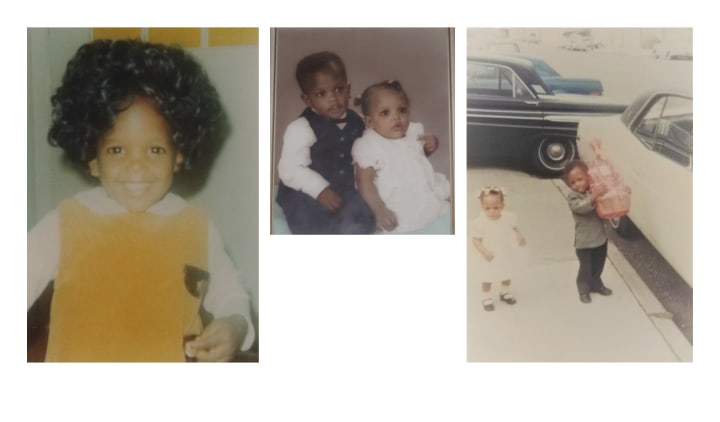
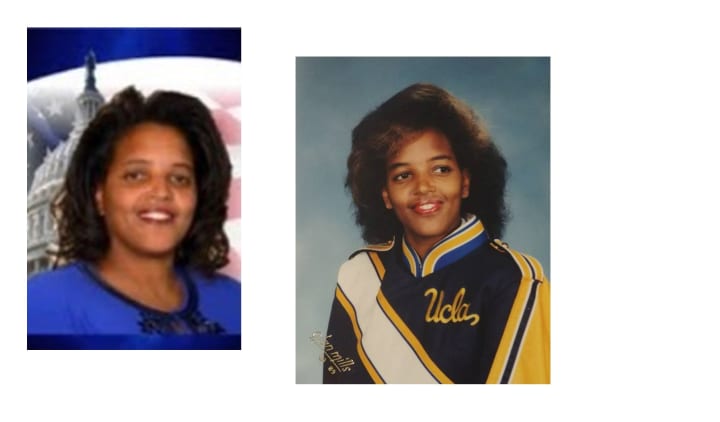
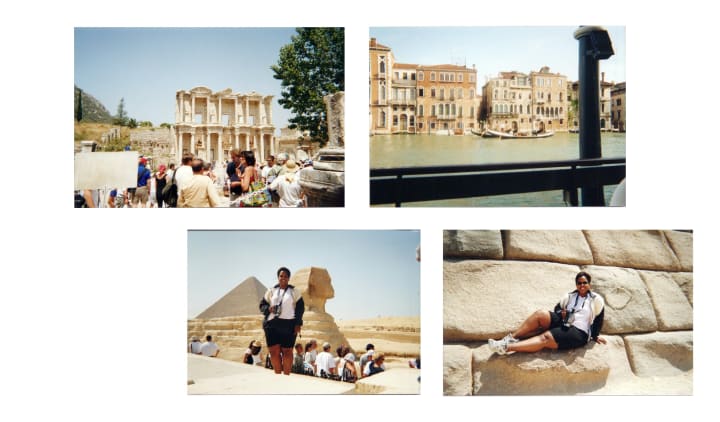
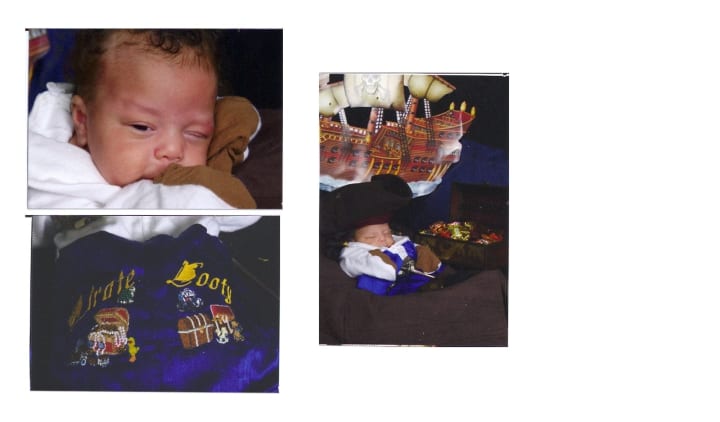
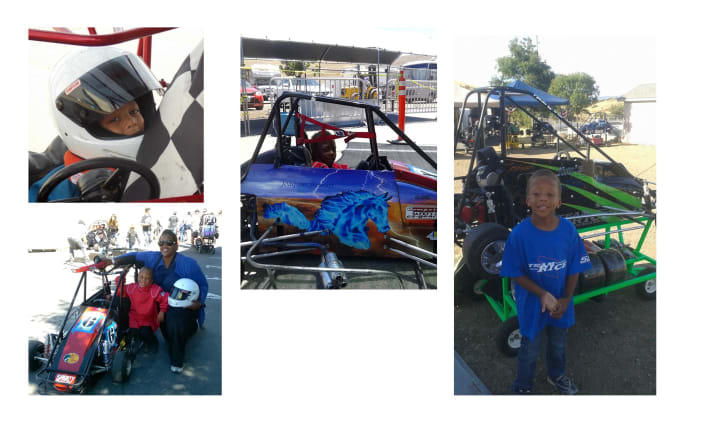
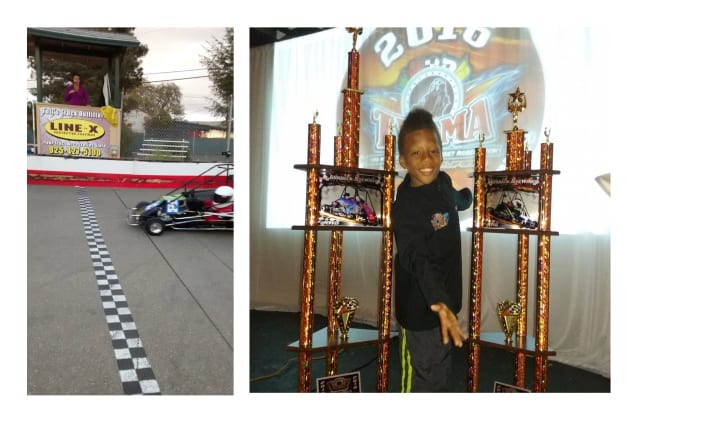
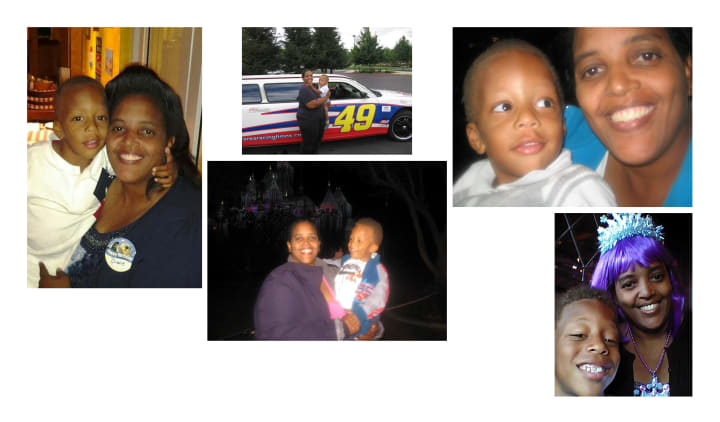
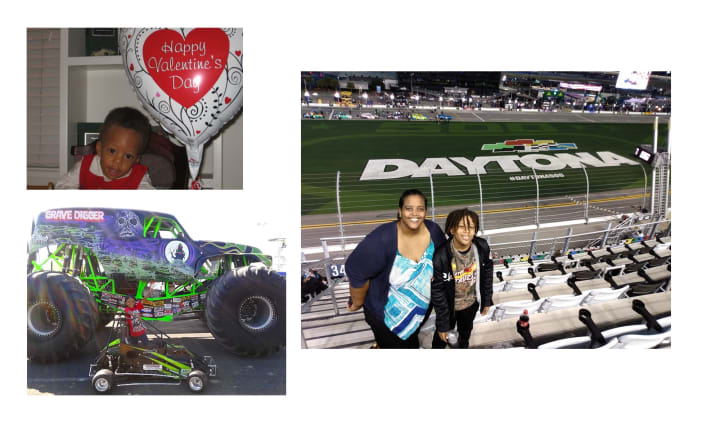

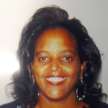




Comments
There are no comments for this story
Be the first to respond and start the conversation.